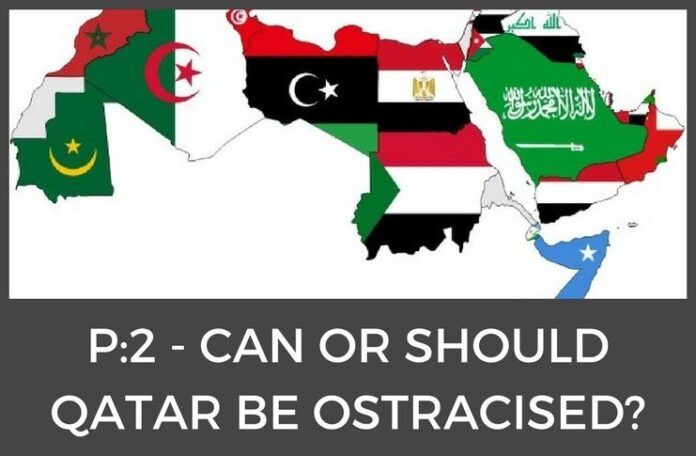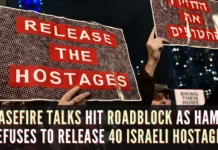
Part 1 of this series can be ‘accessed ‘ here. This is Part 2.
[dropcap color=”#008040″ boxed=”yes” boxed_radius=”8px” class=”” id=””]S[/dropcap]audi Arabia’s main vision is to promote the cause of Sunni Islam, while Qatar’s approach is “friends with everyone.”8 Most of the accusations stem from a misinterpretation of Qatar’s position. For instance, Qatar and Saudi Arabia were aligned on the desire to stabilize Yemen, but Qatar differed on approach: Qatari leader Sheikh Hamad bin Khalifa Al-Thani went to Yemen in 2007 to establish peace, after the fourth Saada war, between the Houthis and the local government. He offered three Houthi leaders Abdul Malik al-Houthi, Abdul Karim al-Houthi and Abdullah Al-Ruzani sanctuary in Doha. Al-Thani’s explanation was that he tried to assist a government, not aid rebels. On a similar basis he offered exiled leaders of the Taliban, Hamas and Muslim Brotherhood, sanctuary; they were not regarded as terrorists but as legitimate political fighters. Saudi Arabia, too, had a similar policy when it hosted Pakistan’s PM Nawaz Sharif and Uganda’s Idi Amin. It did not matter that Amin had shown signs of being a cannibal. Saudi Arabia took the precaution of insisting that they do not indulge in politics while in the country. Much to Qatar’s dismay, Saudi Arabia unleashed its bombs in an asymmetric war against impoverished Yemen.
Saudi Arabia still supports some Sunni groups that are ostensibly trying to overthrow Syria’s Assad
“Friends with everyone” may or may not be a successful policy. When Turkey found that the EU did not want it to join the union, it embarked on a policy, ‘Zero problems with neighbours.’ But zero problems with neighbours ended with zero friends said the cynics. Kemal Ataturk’s policy, too, of “Peace at home, Peace in the world” was short-lived.
In another case, Egypt’s El-Sisi was treating ransom money as financing terrorists, when in fact Qatar had to pay $1 billion for the release of 26 kidnapped royal family members in Iraq. Qatari also felt that, for national reasons, it had to pay $700 million for Iranian causes.9
[dropcap color=”#008040″ boxed=”yes” boxed_radius=”8px” class=”” id=””]N[/dropcap]either Qatar Airlines nor Aljazeera will be folded up. These are world class organisations which show that Arabs can compete successfully in this world. The Qatari Government does not take responsibility for any views expressed by different contributors. It may have an inclination to do so, but in the case of MBC’s portrayal of Black Crows, it is neutral.10 The air blockade against Qatar was “unjustified” and it did cause inconvenience since Saudi and Egypt airspace could not be used. But the Qatari Government offered to pay travellers for the extra expense and it offered to buy 10% of American Airlines as a way of breaking the deadlock. When the International Labour Organisation (ILO) critcized Qatar Airways for breaching gender laws by sacking pregnant air-hostesses, the CEO said that he did not care for the ILO. He had to run a successful business. This shows that Qatar can be stubbornly independent when it comes to “violation of its sovereignty.”11
If one accepts Qatar’s definition of terrorists, out of favour political organisations, and the right to have an independent policy within a GCC framework, one has to accept Qatar’s claim that “it has never supported terrorism … does not support terrorism… and will not support terrorism.12
[dropcap color=”#008040″ boxed=”yes” boxed_radius=”8px” class=”” id=””]I[/dropcap]n fact the Middle East is in such a mess that all the major forces are supporting “terrorism.” Both Wahhabi kingdoms, Saudi Arabia and Qatar, had at one time or another supported Ahrar Al-Sham whose founders were linked to Al Qaeda. Saudi Arabia still supports some Sunni groups that are ostensibly trying to overthrow Syria’s Assad. The US created Al Qaeda to drive the Soviets out of Afghanistan. Osama bin Laden served Al Qaeda in Afghanistan. Israel serviced Hamas during its infancy until it became an adversary. Tehran nourishes Hesbollah, a supposedly terrorist organisation, in Lebanon. Turkey regards some Kurds as terrorists, yet the Kurds are in reality Iraqis, who are supported by the US and Israel in their effort to become an independent state. Had it not been for Russia, says an aged Flemish priest who lives in Syria, there would not be a Syria. Russia is performing the role that Cuba did in liberating South Africa from apartheid. While President Trump pointed at Qatar for terrorism in the Middle East, he is offering for sale state of the art weapons to “dangerous” Qatar. On the other hand, Trump’s Secretary of State Rex Tillerson supports rapprochement and an easing of the blockade on Qatar. Both, Saudi Arabia and Qatar have American troops on their soil.
Saudi Arabia does not need arms; it needs a modern peaceful strategy without outside interference. If not, the Arabs will be, according to one citizen, “hell’s firewood;”13 The dream of an “Arab NATO” will be dead on arrival. It is not Qatar but Saudi Arabia that needs to make a dramatic change for the better.
Bibliography :
- ISIS and ISIL are used interchangeably here.
- Abdulrahman Al Rashed, former editor-in-chief of Ashraq Al-Awsat, “Two choices to resolve Qatar crisis,” arabnews.com, May 2017.
- Businessman Khalaf Ahmad Al Habtoor, “Qatar: Architect of its own isolation,” arabnews.com, June 7, 2017.
- Raina Rabeaa Elabd, “Will Sisi make peace?” al-monitor.com/ Egypt Pulse, April 14, 2016.
- Dr. Joseph Kechichian, Sr. Fellow at king Faisal Centre for Research and Islamic Studies, “GCC crisis: A Thing of the past,” aljazerra.com, May 6, 2014.
- Phil Giraldi, “Terrorism supporters in Washington and Riyadh close ranks against Qatar,” arabnews.com, June 13, 2017.
- CNN news.
- Dr. Manuel Almeida, “What Qatar’s role in Yemen tells about the Gulf crisis,” arabnews.com, June 16, 2017.
- Sr. scholar at the Arab Gulf states Institute of Washington Hussein Ibish, “Unfulfilled 2014 Riyadh Agreement defines current GCC rift,” arabnews.com, June 6, 2017.
- Ben Flanagan, “Did Qatari media side with Daesh by attacking MBC’s Black Crows?” arabnews.com, June 6, 2017. Black Crows refer to women in purdah.
- AFP, “Qatar denounces “unjustified” cuts in Gulf ties,” arabnews.com, June 5, 2017.
- Gareth Davies, “When it comes to terrorism, Qatar has never supported terrorism…” dailymail.co.uk, June 12, 2017.
- Ian Black, “Middle East, 2014,” arabnews.com, August 4, 2014.
- Part2 – China’s Road to Superpower status - July 20, 2017
- Part1 – China’s Road to Superpower status - July 18, 2017
- P2 – Can or should Qatar be ostracised? - June 29, 2017











Good one explaining ground realities